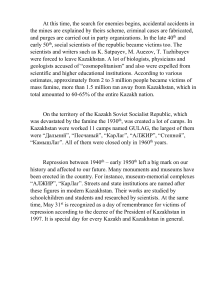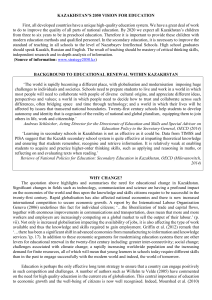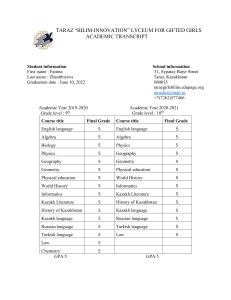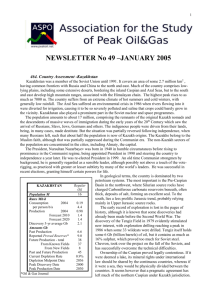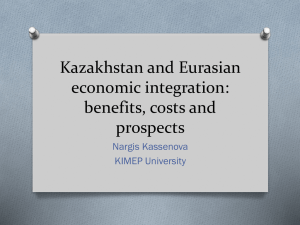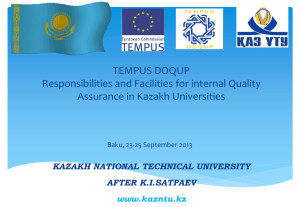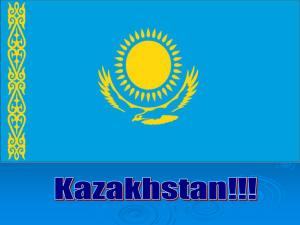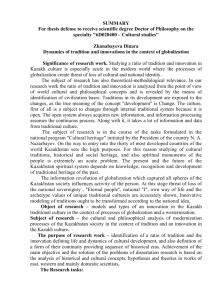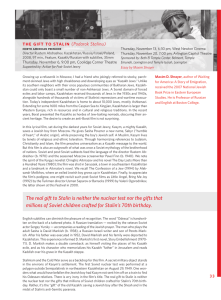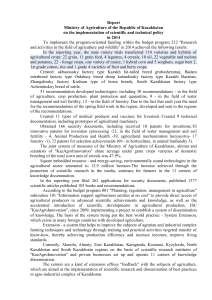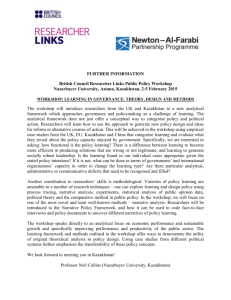Saltanat Meiramova L.N. Gumilyov Eurasian National University
advertisement
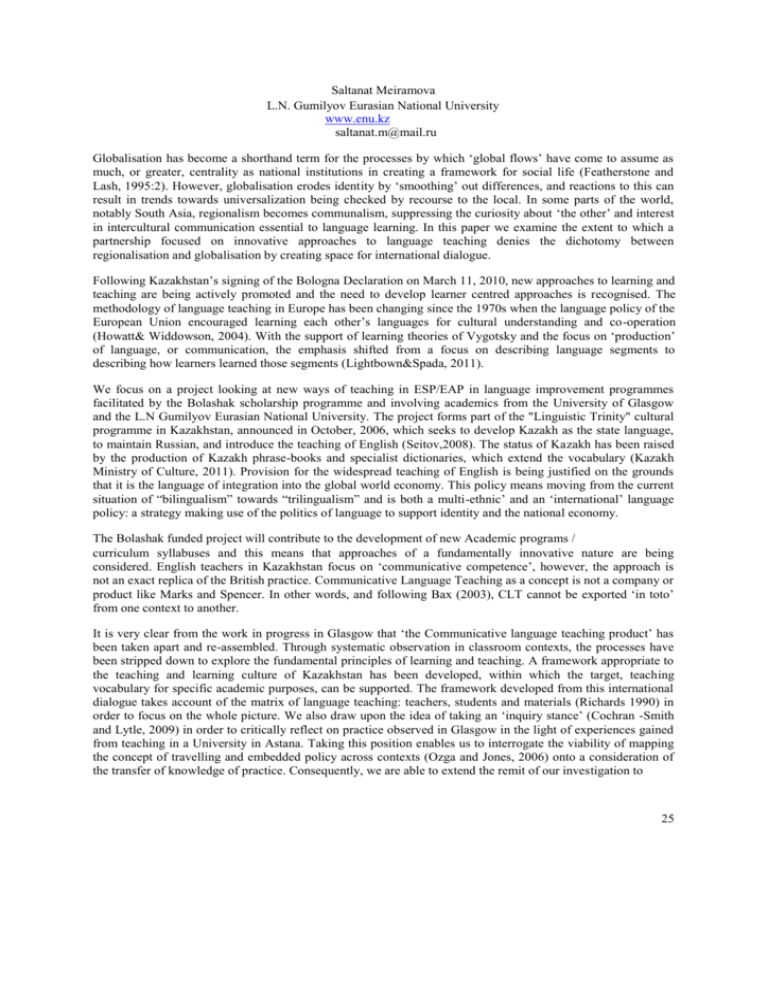
Saltanat Meiramova L.N. Gumilyov Eurasian National University www.enu.kz saltanat.m@mail.ru Globalisation has become a shorthand term for the processes by which ‘global flows’ have come to assume as much, or greater, centrality as national institutions in creating a framework for social life (Featherstone and Lash, 1995:2). However, globalisation erodes identity by ‘smoothing’ out differences, and reactions to this can result in trends towards universalization being checked by recourse to the local. In some parts of the world, notably South Asia, regionalism becomes communalism, suppressing the curiosity about ‘the other’ and interest in intercultural communication essential to language learning. In this paper we examine the extent to which a partnership focused on innovative approaches to language teaching denies the dichotomy between regionalisation and globalisation by creating space for international dialogue. Following Kazakhstan’s signing of the Bologna Declaration on March 11, 2010, new approaches to learning and teaching are being actively promoted and the need to develop learner centred approaches is recognised. The methodology of language teaching in Europe has been changing since the 1970s when the language policy of the European Union encouraged learning each other’s languages for cultural understanding and co-operation (Howatt& Widdowson, 2004). With the support of learning theories of Vygotsky and the focus on ‘production’ of language, or communication, the emphasis shifted from a focus on describing language segments to describing how learners learned those segments (Lightbown&Spada, 2011). We focus on a project looking at new ways of teaching in ESP/EAP in language improvement programmes facilitated by the Bolashak scholarship programme and involving academics from the University of Glasgow and the L.N Gumilyov Eurasian National University. The project forms part of the "Linguistic Trinity" cultural programme in Kazakhstan, announced in October, 2006, which seeks to develop Kazakh as the state language, to maintain Russian, and introduce the teaching of English (Seitov,2008). The status of Kazakh has been raised by the production of Kazakh phrase-books and specialist dictionaries, which extend the vocabulary (Kazakh Ministry of Culture, 2011). Provision for the widespread teaching of English is being justified on the grounds that it is the language of integration into the global world economy. This policy means moving from the current situation of “bilingualism” towards “trilingualism” and is both a multi-ethnic’ and an ‘international’ language policy: a strategy making use of the politics of language to support identity and the national economy. The Bolashak funded project will contribute to the development of new Academic programs / curriculum syllabuses and this means that approaches of a fundamentally innovative nature are being considered. English teachers in Kazakhstan focus on ‘communicative competence’, however, the approach is not an exact replica of the British practice. Communicative Language Teaching as a concept is not a company or product like Marks and Spencer. In other words, and following Bax (2003), CLT cannot be exported ‘in toto’ from one context to another. It is very clear from the work in progress in Glasgow that ‘the Communicative language teaching product’ has been taken apart and re-assembled. Through systematic observation in classroom contexts, the processes have been stripped down to explore the fundamental principles of learning and teaching. A framework appropriate to the teaching and learning culture of Kazakhstan has been developed, within which the target, teaching vocabulary for specific academic purposes, can be supported. The framework developed from this international dialogue takes account of the matrix of language teaching: teachers, students and materials (Richards 1990) in order to focus on the whole picture. We also draw upon the idea of taking an ‘inquiry stance’ (Cochran -Smith and Lytle, 2009) in order to critically reflect on practice observed in Glasgow in the light of experiences gained from teaching in a University in Astana. Taking this position enables us to interrogate the viability of mapping the concept of travelling and embedded policy across contexts (Ozga and Jones, 2006) onto a consideration of the transfer of knowledge of practice. Consequently, we are able to extend the remit of our investigation to 25 include consideration of the scope for developing a community of inquiry on pedagogy within and across cultural contexts. It is from these processes that the components for the Continuing Professional Education of teachers of English Language in Kazakhstan are being developed. In this paper, we hope to show that ‘multi-ethnicity’ and ‘internationalism’ are the defining features of both the work of the partnership with the Bolashak scholar and the Kazakhstani state. References Bax, S. (2003) ‘The end of CLT: a context approach to language teaching’. English Language Teaching Journal 57 (3): 278-287 Byram, M. (1997). Teaching and Assessing Intercultural Communicative Competence. Clevedon: Multilingual Matters. Cochran-Smith, M and Lytle, S.L (2009) Inquiry as Stance: Practitioner Research in the Next Generation. New York, Teachers College Press. Featherstone M, Lash S, (1995), ‘Globalisation, modernity, and the spatialization of social theory: an introduction’, in M. Featherstone, S. Lash, R. Robertson (Eds) Global Modernities. London: Sage. pp 1 – 24. Howatt, A.P.R. with Widdowson, H.G. (2004) A History of English Language Teaching. Oxford: Oxford University Press. Kazakh Ministry of Culture (2011) Strategic plans of Ministries of Kazakhstan till 2020. (2011). An extract from the Strategic Plan of the Kazakh Ministry of Culture for 2011-2015. Lightbown, P.M. & Spada, N. (2011) How Languages are Learned. Oxford: Oxford University Press. Ozga, J and Jones, R (2006) Travelling and embedded policy: the case of knowledge transfer. Journal of Education Policy 21(1): 1-17 Richards, J.C. (1990) The Language Teaching Matrix. Cambridge: Cambridge University Press. Rivers, W.P. (2005). “Factors influencing language choice among undergraduates in Kazakhstan” in Edited proceedings of the 6th International Language and Development Conference: ‘Linguistic Challenges to National Development and International Co-operation’.National Development, Education and Language in Central Asia and Beyond. London: British Council. pp. 20-27. Seitov, A. (2008) “Linguistic Trinity”. Baiterek magazine1(28). Smagulova, J. (2005). “On the likelihood of language conflict in Kazakhstan” in Edited proceedings of the 6th International Language and Development Conference: ‘Linguistic Challenges to National Development and International Co-operation’.National Development, Education and Language in Central Asia and Beyond. London: British Council. pp. 28-37.
